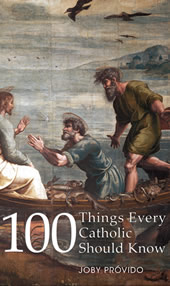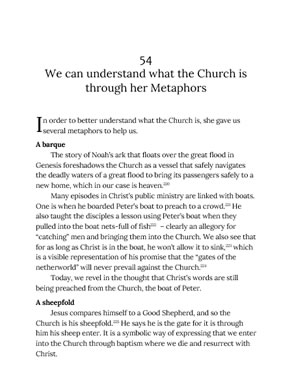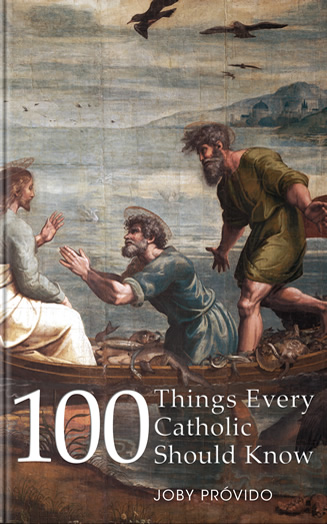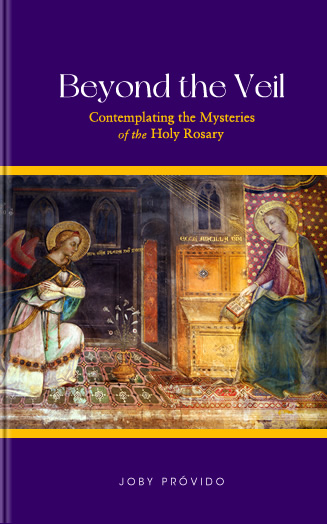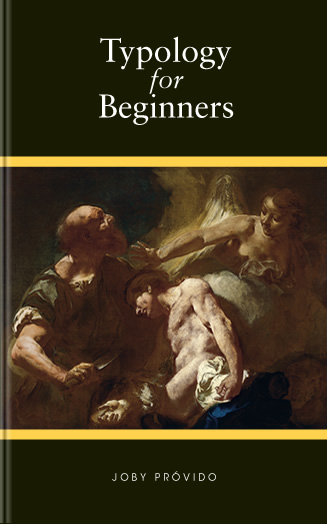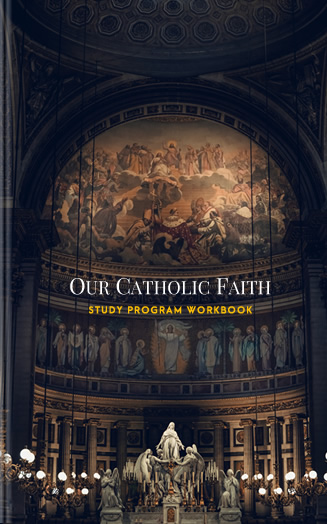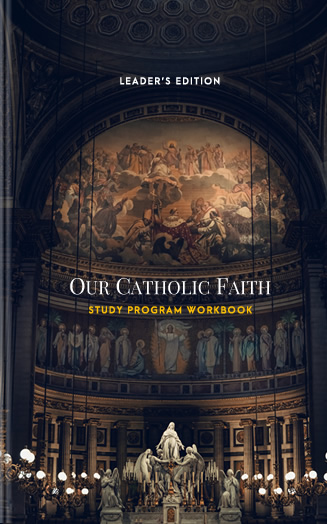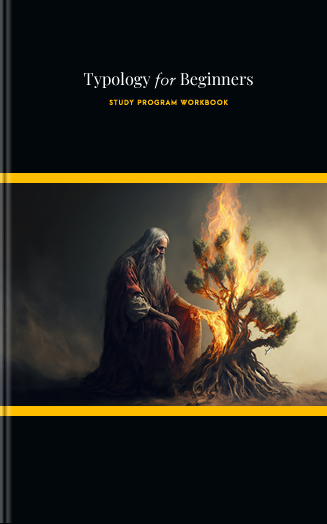100 Things Every Catholic Should Know covers what it is we believe in the Creed, how grace configures us to Christ in the sacraments, how we worship in the liturgy, how we connect to God in prayer, how Mary and the saints fit in in all of this, and how we are part of Christ’s Mystical Body – the Church.
Whether you are an active member of the Church, a lapsed Catholic, or new, this book will gently explain what it is we believe in a very accessible language.
THE BOOK
Whether or not you are new to the Catholic Church, or struggling, or lapsed, or dynamically involved, this book will enlighten you with the essentials of the Faith that have been handed down to us by the apostles.
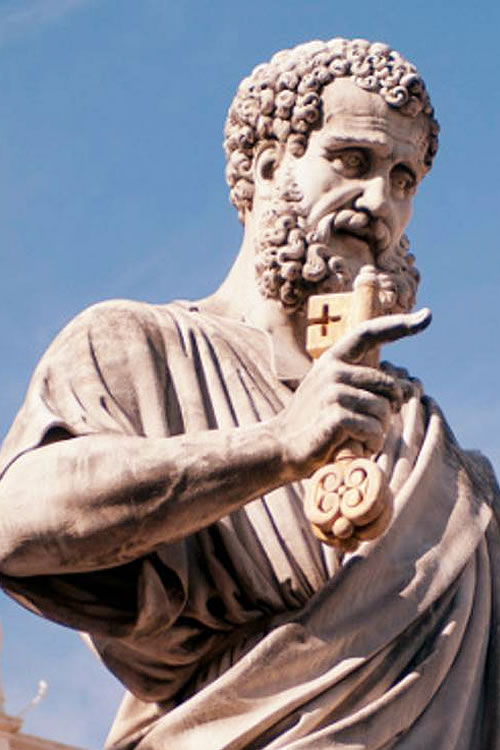
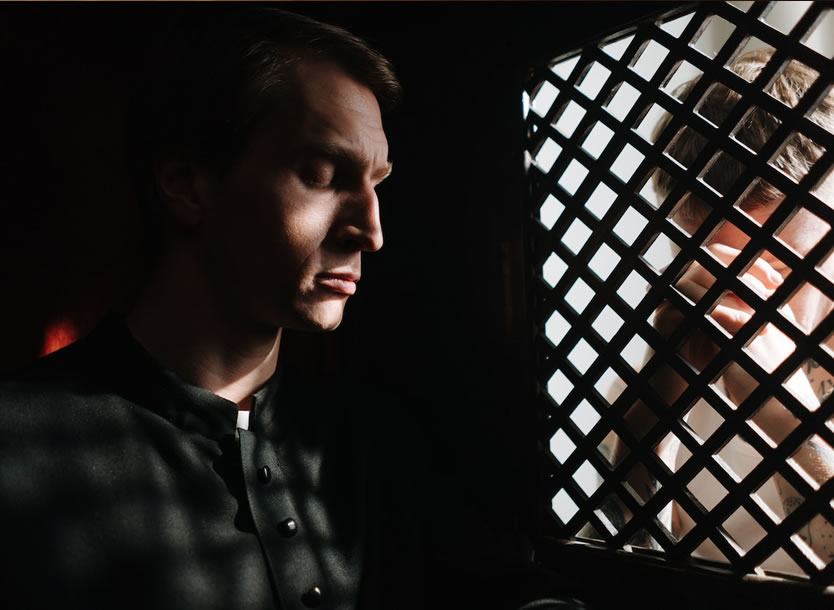
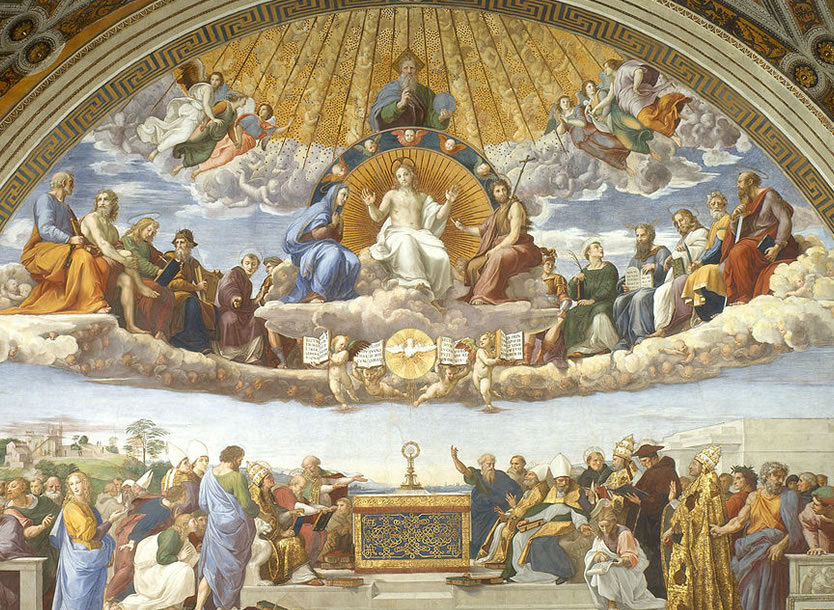
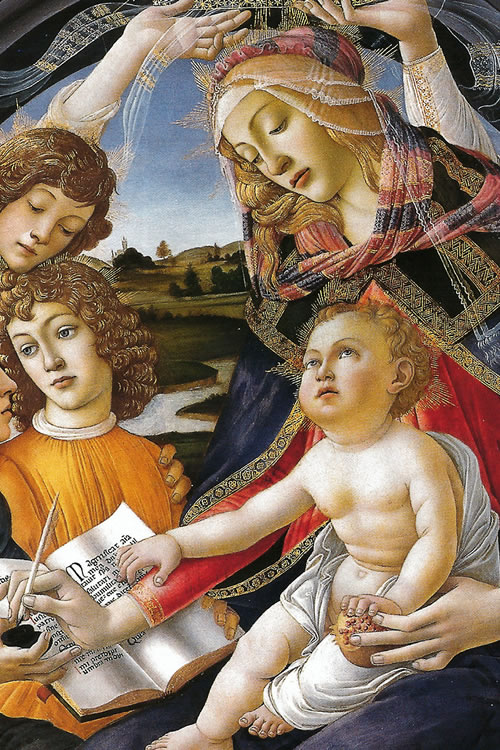
Clearly and concisely written
This book was written primarily for Catholics who want to know more about their Faith, and are drawn to concise text. Each of the 100 topics is easy to read and distilled into bite-sized portions. Through cross-referencing, the book also shows how the topics are interrelated. Those who are new to the Faith will find this book an edifying handy reference, and those who have simply forgotten will find it a great review material that might spark a new love for God and religion.
Topics flow logically
It is also written for others who are curious about Catholicism. In 100 Things Every Catholic Should Know, the author arranges the principle beliefs of the Catholic Faith as short phrases in a logical sequence so they build upon each other. Although the text for each topic is concise, the coverage is extensive. With this accessible contemporary style, this book will help readers appreciate the individual doctrines and how they relate to the entire Faith when woven together.
Coverage is extensive
Readers will find that the Catholic Faith is not as intricate at is it seems, but rather follows only a few tenets when distilled to its basic essentials. Readers will find out about God’s nature; man as his creation; original sin; God’s loving plan of salvation; why it is apporpriate that the savior omust be God and man at the same time; why we believe Jesus did this through his passion and death; that Jesus established a Church to perpetuate his teaching, sacraments, and leaders; and why we need to pray.
READ THE WAY YOU WANT
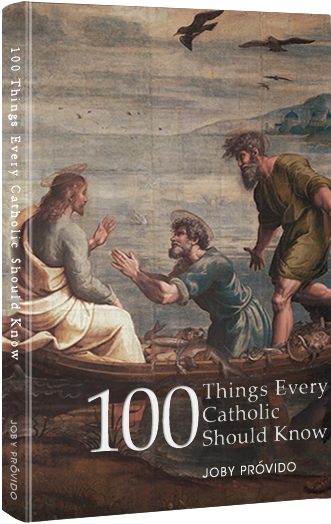
| Paperback | ||
|---|---|---|
| ISBN 13 | 978 621 02 1718 6 | |
| ASIN | B085KN36T8 | |
| Publisher | Kindlings Press | |
| Publication Date | March 6, 2020 | |
| Language | English (American) | |
| Size | 6" x 9" | |
| Pages | 209 cream | |
| Cover | Full color, matte-finished | |
| BUY ON AMAZON | ||

| Hardbound | ||
|---|---|---|
| ISBN 13 | 979 871 97 8891 3 | |
| ASIN | B08YNVM6QM | |
| Publisher | Kindlings Press | |
| Publication Date | March 10, 2020 | |
| Language | English (American) | |
| Size | 6" x 9" | |
| Pages | 209 cream | |
| Cover | Full color, matte-finished | |
| BUY ON AMAZON | ||

| Kindle Ebook by Amazon | |
|---|---|
| File Size | 787 KB |
| ASIN | B085M2PTLY |
| Publisher | Kindlings Press |
| Publication Date | March 6, 2020 |
| Print Length | 234 pages |
| Language | English (American) |
| Text-to-Speech | Enabled |
| X-ray | Not Enabled |
| Word Wise | Enabled |
| Enhanced Typesetting | Enabled |
| Sticky Notes | On Kindle Scribe |
|
Download the free Kindle App and start reading today. |
|
| BUY ON AMAZON | |
Now an AUDIO BOOK you can listen to!
Listen as you drive, workout, or bask under the sun.EXCERPTS
1
God is a Spirit
Jesus himself said to the Samaritan woman that God is a spirit:
“God is Spirit, and those who worship him must worship in Spirit and truth.”
John 4:24
A spirit doesn’t need space and cannot die
The visible universe, including you and me, is made out of matter that requires space to occupy. But, a spirit is a being that is not made out of matter. Therefore, it doesn’t need space.
A spirit is a whole being and doesn’t have parts that can be divided into smaller parts. As such, it cannot decay or be destroyed. Thus, it cannot die; it is immortal.
A spirit knows, loves, and wills
A spirit can know things. It can understand, learn, and formulate ideas. It also can love and be loved in return. It can also will, which means it can decide to do something.
2
God is an infinitely perfect spirit that does not change.
God is a spirit but is perfect in every way. That means nothing can be added or removed to improve him.
Because nothing changes in God, Saint Paul says, “Jesus Christ is the same yesterday, today, and forever.”
God is knowledge
Since God has perfect knowledge about everything, we say he is knowledge itself.
God is love
God’s love is perfect. That means neither time, nor space, nor can our sins limit God’s love for us. God loves all of us – even the most unrepentant criminal. God loves Satan and all the fallen angels. God loves non-Christians, atheists, and those who don’t even think there might be a God. We don’t need to do anything for him to love us; he just does.
Because his love is unconditional, Christ declared, “God is love” itself.
God is almighty
Since God’s will is perfect, it is limitless. It means anything he wants to happen, will happen. In the same sense, God is all-powerful.
3
God is existence itself
On Mount Sinai, God gave Moses a mission to lead his people out of Egyptian slavery. Since different nations and cities worshipped different gods during that time, Moses asked God for his name to know which one to whom he was speaking.
God replied, “I am who am.” This is not a name. Instead, God was revealing to us his eternal nature.
“In revealing his mysterious name, YHWH ("I AM HE WHO IS", "I AM WHO AM" or "I AM WHO I AM"), God says who he is and by what name he is to be called. This divine name is mysterious just as God is mystery. It is at once a name revealed and something like the refusal of a name, and hence it better expresses God as what he is - infinitely above everything that we can understand or say: he is the "hidden God," his name is ineffable, and he is the God who makes himself close to men.
CCC § 206
4
God is an eternal spirit
Because God is existence itself, nothing created him. He didn’t even create himself. He always existed; there was never a time he didn’t exist. Saint Thomas Aquinas said, he is, “who is the sheer act of being itself.”
God transcends time
Time is the measurement of change because if nothing changes, then we don’t know that time is passing. Since God doesn’t change (from #1,) time has no effect on him. In a manner of speaking, time has no power over him. This is why we say God transcends time. It means he is above time.
God has no beginning and no end
The word beginning and end connote a point in time. Since time does not affect God, then there cannot be time-related ideas such as beginning or end for him.
In human terms, when we say God has no beginning, we are stating that no one created him. When we say God has no end, it means he is immortal (from #1) and will continue to exist forever.
All history is present to God
Unlike humans who experience time in a linear fashion, all history of the universe is present to God because he transcends time.
34
God the Son became human in Jesus
The moment Mary consented to God’s plan with her words, “Behold, I am the handmaid of the Lord. May it be done to me according to your word,” the Holy Spirit overshadowed her and she conceived Jesus.
It is at this point God became flesh. We refer to this as The Incarnation that comes from the root word that means “meat” or “flesh.” It basically means, “to make something flesh.”
In the process of the incarnation, however, the Son did not lose his divinity.
The incarnation compels us to make a choice
Christianity is neither a remember-what-Jesus-did club, nor let’s-follow-what-Jesus-taught society (although these are part of it.) Christianity, in its strictness sense, is a who-Jesus-is assembly. We profess that he is the incarnate Son of God, and that makes all the difference.
We can accept his divinity as the truth, or reject it as a lie, but there can be no in between. C.S. Lewis says it eloquently:
“Either this was, and is, the Son of God, or else a madman or something worse. You can shut Him up for a fool or you can fall at His feet and call Him Lord and God. But let us not come with any patronizing nonsense about His being a great human teacher. He has not left that open for us.
C.S. Lewis , Mere Christianity
By accepting the doctrine that Jesus is God, we make a bold claim that the founder of Christianity is God himself – which is something no other religion can claim.
But, if we do accept him as God, then we must follow, obey, and worship him as such. To do otherwise is only evidence that we really don’t believe it.
41
Mary is ever-Virgin
In the Annunciation, the Angel Gabriel told Mary she would conceive. In reply, Mary asked the angel, “How can this be, since I have no relations with a man?”
This was an odd question since she was already betrothed to Joseph at that time. In the Jewish tradition of that period, they were already as good as husband and wife; the only thing Joseph needed to do was take her home so she could live with him. For a wife, it shouldn’t be puzzling how she was to get pregnant. Mary’s answer reveals to us her plan from the start: she wasn’t planning to have marital relations with Joseph.
The angel explained that the Holy Spirit will overshadow her, and so Mary conceived without a human agent. This is the miraculous conception and birth of Jesus.
The Church, therefore, teaches us that Mary was a virgin before the conception of Christ, during the birth of Christ, and after the birth of Christ.
Mary had no other children
Scripture is seemingly littered with verses where Mary had other children. We have to take into consideration that the Bible was written in Greek and the words used for these verses are “adelphos or adelphoi” and these did not only mean blood-brother, but close relatives as well.
For example, in the King James Version of the Bible, Lot is said to be “Abraham’s brother’s son.” That makes Lot the nephew of
Abraham. But, two verses later, Lot is referred to as “brother” of Abraham. This, of course, is an issue of translation. Since adelphos had a wide range of meanings, the scribe translating these verses used different meanings for the same person.
So the adelphoi used for “brothers and sisters” of Christ don’t pertain to other children of Mary.
Saint Paul helps us see the truth
When Paul wrote the Galatians, he said:
“Then after three years I went up to Jerusalem to see Peter, and abode with him fifteen days. But other of the apostles saw I none, save James the Lord’s brother.”
Galatians 1:18 KJV
This is a revelation because this James is the same person whose name keeps popping up repeatedly as “the Lord’s brother.” It is such a blessing that Paul establishes that this particular James is an apostle because there are only two apostles named James. From the Gospel of Matthew, we know James the Greater is the brother of John who are both sons of Zebedee. The other James is the son of Alphaeus. None of these Jameses are sons of Joseph! It is clear, then, that the translation of adelphos in these verses does not mean blood-brother.
Jesus gave Mary to John
During the crucifixion, Jesus gave Mary to John. In the Jewish custom of that time, it is the other brothers who should take care of their mother. Therefore, what Jesus did would be extremely insulting to his brothers, unless of course he never had any blood brothers.
65
Sacraments are visible signs of invisible grace
In Latin, the word sacramentum means sign of the sacred, and these are exactly what sacraments are: they are the tangible signs of grace.
In the Church, there are seven: baptism, confirmation, the Eucharist, reconciliation, anointing of the sick, holy orders, and marriage.
Humans are made of an invisible soul and a material body. Sacraments are similar in the sense that they are made of invisible grace conferred by material substance. It is not the material itself that gives grace but God. The material is there so that there is something tangible, for us who live in a material world, to identify with.
With this as context, Sacraments are like an encounter with Christ who bestowed grace through his physical body. For example, the Sacrament of Reconciliation forgives sins that way Christ did. The Anointing of the Sick heals the sick that way Christ did. Holy Orders makes priests and bishops the way Christ ordained his apostles during the Last Supper.
66
Sacraments are efficacious
When a minister administers a Sacrament, it is efficacious. That means grace is guaranteed to be given to the receiver.
Grace does not depend on the minister
The sinfulness of a minister does not render a sacrament invalid; neither does the holiness of a minister make the sacrament more potent. Grace is a gift from God and, therefore, has nothing to do with the holiness of the minister. If God would give grace only through sinless ministers, he would be doing something impossible because there would be no acceptable minister since we are all sinners.
Grace configures us to Christ
Original sin disfigured humankind in a way that we no longer look like God, and nothing else but a configuration to Christ is what can repair this deformity. Grace from the Sacraments configures us to Christ – that is it makes us like Christ. For example, when we eat his body and drink his blood during Holy Communion, we become what we eat and drink. Holy Order makes the ordained men into priests, prophets, and kings as Christ is. In marriage, men are made to resemble Christ who gave his life for his bride, the Church.
The effect of grace depends on the receiver’s disposition toward it
While grace is surely bestowed upon the receiver (its efficaciousness), its effects depend on how the receiver cooperates with it. Grace can be rendered ineffective on someone who competes with it, but grace can transform someone who allows it to configure him or her to Christ.
HIGHLIGHTS
OTHER BOOKS
Beyond the Veil
Contemplating the Mysteries of the Holy Rosary
Learn how to contemplate the mysteries of the Holy Rosary while saying the vocal prayers.
A Sky Full of Stars
Know Our Lady through her titles in the Litany
Get to know Mary as each of her titles in the Litany of the Blessed Virgin Mary is explained meticulously.
Typology for Beginners
A Catholic Perspective on Understanding the New Testament through the Old Testament
See the subtle patterns emerge as the New Testament is read in the context of the New Testament. Obscure verse become clear, and the Bible exciting again.
Our Catholic Faith - Workbook
For A Study Program
A deep dive into the Catholic Faith for study groups or individual use. The program uses a unique blend of Sacred Scripture and Tradition to help the participant explore what it is Catholics believe.
Our Catholic Faith - Leader Workbook
For A Study Program - Leader's Edition
Everything you need to run the Our Catholic Faith Study Program. This edition includes a setup guide, and answers to the guide questions.
Typology for Beginners - Workbook
For A Study Program
Unlock the hidden treasures of the Bible and dive into the world of typology to embark on a journey of discovery to how Old Testament types foreshadow Christ, Mary, Salvation, the Church, and the Sacraments.


